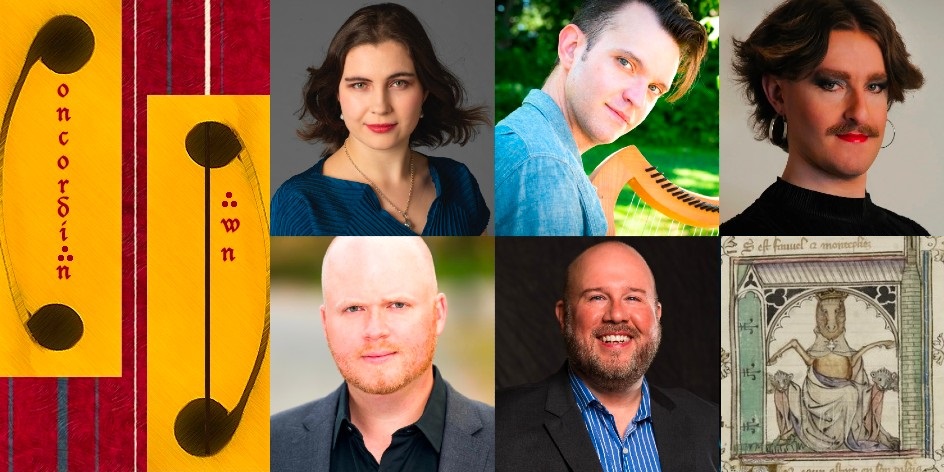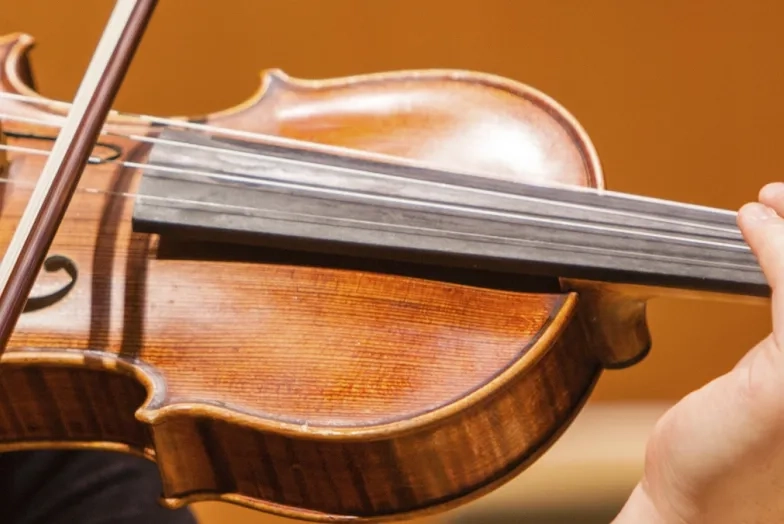Concert: Concordian Dawn
Historical Performance
No tickets required for this event.
Concordian Dawn brings life to the fourteenth-century French allegory, Le Roman de Fauvel, illuminating its relevance to modern audiences through a multimedia presentation of music, text, and art. Their adaptation of the roman includes musical transcriptions and translations of poetry from Chaillou de Pesstain’s “edition” of Fauvel, found in F-Pn fonds fr. 146, accompanied by a projection of manuscript illuminations and original artwork by visual artist, Benjamin Thorpe. Altogether, the music, art, and text evoke resonance with modern times, as the manuscript itself represents not only an interdisciplinary tour-de-force of the fourteenth century, but also an important historical document rife with political and social commentary. It tells the story of an orange-hued half-donkey/half-human whose contentious rise to power unsettles a nation—a story all too familiar to us today.
Program
Le Roman de Fauvel (F-Pn fonds fr. 146, 1r-45r)
redacted and adapted by Christopher Preston Thompson, performed by Concordian Dawn with original artwork and visual presentation by Benjamin Thorpe.
Le Roman de Fauvel
Favellandi vicium
Super cathedram / Presidentes in thronis / Ruina
Heu quo progreditur
In mari miserie / Manere
Ad solitum vomitum / Regnat
Detractor est nequissima / Qui secuntur / Verbum iniquum
Clavus pungens acumine
Quasi non ministerium / Ve, qui gregi / Trahunt / Displicebat ei
Porchier mieus estre ameroie
Je voi douleur / Fauvel nous a fait present / Fauvel: autant m'est si poise
Veritas arpie / Johanne
Conditio nature defuit / O Natio nephandi generis / Mane prima sabbati
Douce dame debonaire
Ay, Amours! tant me dure
Je qui poair seule ai de conforter
Inter amenitatis tripudia / O livor anxie / Reverenti
Bonne est amours / Se me desirs
Vade retro, sathana
Aman novi probatur / Heu, Fortuna subdola / Heu me, tristis est
Gaudet Favellus nimium
Thalamus puerpere / Quomodo cantabimus
Charivari, Sottes chanson, et Lai d’Hellequin
Estote fortes in bello
Tribum que non abhorruit / Quoniam secta latronum / Merito hec patimur
Celi domina / Maria, virgo virginum / Porchier mieuz estre
Firmissime fidem / Adesto, sancta trinitas / Alleluya, Benedictus
Garrit Gallus flendo dolorose / In nova fert animum mutatas dicere formas / Neuma
Concordian Dawn Ensemble
Amber Evans, soprano and percussion
Clifton Massey, countertenor
Thomas McCargar, baritone
Niccolo Seligmann, vielle
Christopher Preston Thompson, director, tenor and harp
Artist Profiles
Concordian Dawn, ensemble for medieval music, specializes in 12th- through 14th-century vocal repertoire, drawing on primary source material and focusing on socio-philosophical similarities between texts from centuries ago and the mindset of modern society. In doing so, the ensemble produces a musical experience accessible to contemporary audiences, relating the human condition of the past to the familiar experiences of the present. Concordian Dawn, a 2024 UC-Davis Ensemble-in-Residence, was founded in 2012 and performs regularly on the east coast, annually with Gotham Early Music Scene in NYC, and at venues across the country. The ensemble’s “mesmerizing” (Early Music America) debut album, Fortuna Antiqua et Ultra (MSR Classics), was released in December of 2021 to critical acclaim. The ensemble's second album—based on their collaboration and publication with medieval studies scholar Sarah Kay, entitled Medieval Song from Aristotle to Opera—was released in October of 2023 (MSR Classics) following the 2022 book/website publication (Cornell University Press). Concordian Dawn made its west coast debut in 2022 with the Santa Cruz Baroque Festival and at UC-Berkeley and UC-Davis. The ensemble, which received a 2020 Ensemble Forward Award from Chamber Music America, and its director, Christopher Preston Thompson, have performed and led workshops and lectures for Princeton University, Stanford University, the San Francisco Conservatory of Music, New York University, the University of Pennsylvania, the Modern Language Association, the CUNY Graduate Center and the Medieval Academy of America, among others. For more information, please visit www.concordiandawn.com.
Artist Benjamin Thorpe works with everyday subject matter such as flowers and figures, evoking a sense of movement and ephemerality through fluid lines and visible brushstrokes. On his website, www.benjaminthorpe.com, he says: “I try to carry the spontaneity of drawing into the painting process [and my work is] informed by histories of baroque painting and medieval marginal art…My photographs incorporate personal, diaristic subject matter and are titled according to the date on which they were taken. Implicit in many of them is the replacement or burial of figurative elements through recurring motifs of shadow, blur, transparency, and reflection. My practice also extends beyond the studio; in recent years I have collaborated with musicians, scholars, and other artists, led public tours as a docent at the Met Museum, and published writings on both contemporary art and art history. I was born in Dinajpur, Bangladesh, and grew up between Dhaka and Maine. I completed my MFA in Art Practice at the School of Visual Arts in 2014, and currently live in Oakland, California with my spouse—musician Michele Kennedy—and our baby daughter.”
Departments
Faculty
About SFCM’s Historical Performance Department
Historical Performance at SFCM traverses all eras of music history, allowing for an environment that enables the study of period performance practice and produces contemporary performances that are relevant, vibrant, and provocative. In this program, which offers a professional studies diploma in historical performance and bachelor's and master's music degrees in harpsichord and organ and master's and professional studies diplomas in baroque violin, viola, cello historical plucked strings, and viola da gamba, you’ll develop and refine your skills in historical styles. Historical Performance opportunities are open to all SFCM students, and our acclaimed Baroque Ensemble performs regularly throughout the year.
View SFCM'S Event Health and Safety Policy
As of April 1, 2023, face masks will be optional and at personal discretion for all SFCM concerts & events. Vaccinations are not required for visitors and guests to campus buildings and performances. Please visit SFCM's full Event Health & Safety policy to read more about our guidelines.
